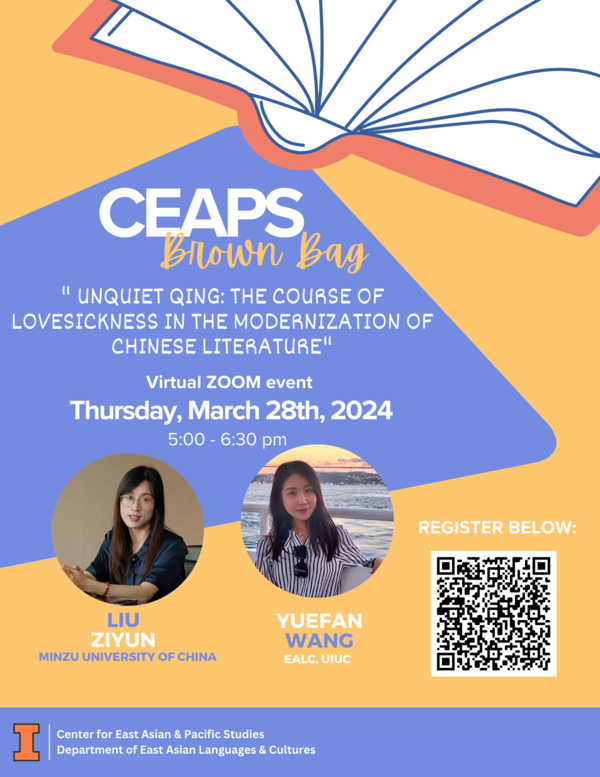
CEAPS Brown Bag | Liu Ziyun + Yuefan Wang " Unquiet Qing: The Course of Lovesickness in the Modernization of Chinese Literature"
- Event Type
- Lecture
- Sponsor
- Center for East Asian and Pacific Studies; Department of East Asian Languages and Cultures
- Date
- Mar 28, 2024 5:00 - 6:30 pm
- Speaker
- Ziyun Liu (Minzu University of China) + Yuefan Wang (EALC, UIUC)
- Registration
- Zoom Webinar Registration
- Contact
- Yuchia Chang
- yuchia@illinois.edu
- Views
- 261
- Originating Calendar
- CEAPS Events Calendar
Abstract
Lovesickness (xiangsi bing), a disease of qing (sentiment, passion, feeling, desire, and love), emerged as a literary topos in China’s medieval lyrical tradition and was developed through late imperial drama and fiction. This article examines narratives of lovesickness in popular literature—both fiction and drama—from the Song (960–1279) to the Qing (1644–1912), including some texts rarely discussed in English scholarship from the perspective of love writing. With thorough documentation, we present two classic plot patterns of the literary malady: one involving mutual affection of separated lovers, the other the one-sided passion, whether of unrequited (usually male) love or of one part of a couple longing for reunion. We argue that the notorious lovelorn figures in late Ming (sixteenth and seventeenth centuries) legal cases and Qing scholar-beauty xiaoshuo novels made lovesickness a target for criticism by literati and prompted reflection and revision of traditional narratives. With the modernization and westernization of Chinese literature, this classical literary malady was finally “cured.” The disappearance of lovesickness reflects the gradual replacement of classical ways of thinking with a modern cognitive style and, simultaneously, the transition of Chinese literature from classical to modern.
Bios
Yuefan Wang is lecturer of Premodern Chinese Literature at the University of Illinois Urbana-Champaign. She earned her Ph.D. in East Asian Languages and Cultures at UIUC. Her research interests lie in Ming and Qing literature, women’s and gender studies, transnational garden culture, and Sino-Japanese literature relation. Her interdisciplinary project, “Written Gardens Revisited: Gender and Women’s Garden Poetry in Late Imperial China,” was awarded the 2023 School of Literatures, Cultures, and Linguistics Dissertation Completion Fellowship at UIUC. Her papers have appeared in both English and Chinese journals, including Journal of Chinese Literature and Culture (AHCI), Prism: Theory and Modern Chinese Literature (ESCI), Classics and Interpretation (經典與闡釋, CSSCI).
Liu Ziyun is Associate professor at Minzu University of China. She specializes in pre-modern Chinese literature and culture, especially the fiction and drama of the Ming and Qing dynasties. Her research interest focuses on two interrelated and mutually reinforcing areas: the transformations of narrative paradigms in classical Chinese novels, and the narrative logic and cultural aspects of popular literature in late imperial China. Her book Untiring Creation: Literary Objects and the Unfolding of Everyday Narratives in Ming and Qing Fiction 摹物不倦:物象與明清小說日常敘事的展開 (2023) addresses the role of literary objects in shaping the narrative of female’s everyday life in longer-length domestic novels during the seventeenth to eighteenth centuries. Her second book project aims to explore narrative logic and mode of affect and its interplay with conceptional basis in popular literature of late imperial China. Her other publications are concerned with Jin Ping Mei Cihua, Rulin Waishi, and Dream of the Red Chamber.